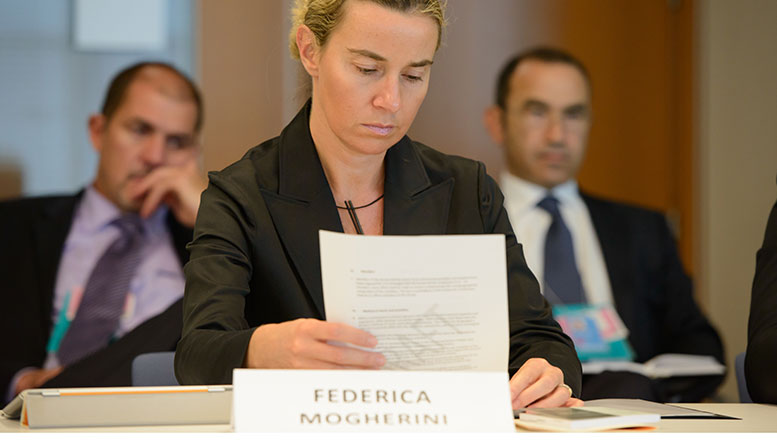José Ramón Cabañas Rodríguez is Cuba’s First Ambassador to the United States, appointed two months after the restoration of diplomatic relations on September 17, 2015. Prior to becoming Cuba’s ambassador in Washington, he was Chief of the Cuban Interests Section in that city.
Ambassador Cabañas holds a bachelor’s degree in international political science achieved in 1983 from the Raúl Roa García Higher Institute of International Relations in Havana. He has also worked as a senior professor at the university. While he served as Vice Minister of Foreign Relations, he earned his Ph.D. in political science from the University of Havana.
In 1984 he joined the Cuban Ministry of Foreign Affairs where he wrote “Radio Marti: A New Aggression.” Following his two years at the Ministry, Ambassador Cabañas transferred to the North America Division.
The Ambassador’s former roles included Ambassador to Austria (2001), Director of Document Management at the Ministry of Foreign Affairs (2005), the Vice Minister of Foreign Relations of Cuba (2009), Ambassador to various international organizations in Austria, and Third and Second Secretary at the Cuban Embassy in Ottawa.
During his years as Cuba’s Ambassador, Cabañas has traveled throughout the United States to present at many organizations’ events to speak on business and investment and U.S.-Cuba relations.
Cabañas is married to Edilia González and has two children.
Cuba Business Report: You often mention in your Twitter account “one door closes, another one opens.” What are the most important doors opening for Cuba – investment-wise in recent months – and why?
Ambassador Cabañas:
The United States is the only country that imposes a unilateral system of sanctions against Cuba. Then, it is preventing itself from being part of the many changes taking place in our economy. Cuba’s legislation doesn’t limit American companies from investing or doing trade with Cuban counterparts. That means that the rest of the world is open to doing business with Cuba.
For many years Canada and Spain have been among the largest investors in Cuba, but now you see non-traditional partners of Cuba looking for new opportunities in Tourism, Biotechnology, IT Technologies and they come forward. Consider that the Mariel Special Economic Zone puts Cuba on the regional map of freight shipping like never before, the way transhipping can be handled in the Caribbean has changed dramatically.
And we have opened doors in the world not only for economic ventures. People come to Cuba to share and learn on how we tackle climate change, to know why we are resilient in the face of natural disasters, how we can afford to provide free and good quality health care and education to our population, how we build a society without violence, without opioid crisis. Cuban universities respond daily to foreign exchange initiatives, cultural fests welcome artists from many countries and vice versa.
Cuba Business Report: U.S.-Cuba relations have experienced a huge setback under the administration of President Trump. Many setbacks occurred – which have included further restriction of US travel to Cuba, limitations on remittances, etc., all of which have hurt the Cuban people. On the business front – can American business still move forward and invest in Cuba in the current environment?
Ambassador Cabañas:
We still have American companies doing business in Cuba and we have others coming forward with new proposals. American businessmen know how meaningful Cuba could be for their ventures, from Agriculture and communications to Civil Aviation and sea trade. The so-called new policy on Cuba announced in 2017 is actually a recycling of the blockade fiasco. Twelve different American administrations have spent billions of dollars for regimen change in Cuba in exchange of nothing, cero, nada. And we have to say that the impact is on both sides, not only on Cuba. United States federal agencies know that the need to exchange information and coordinate actions with Cuba on alien smuggling, on drug trafficking, on cybercrime, oil spill in the Caribbean Sea, search and rescue at the Florida Straits, tropical diseases, storms and hurricanes, to mention a few subjects. The fact that you don’t like your neighbour doesn’t mean that someone has to move.
And there is a large human impact. The majority of more than one million Cuban Americans living in the States want to protect the so-called family agenda: travel, communications, remittances, parcels, mail. American scientists know about the potential outcome of cooperation with Cuba in terms of reducing the rate of cancer, diabetes, heart diseases among the population. Would you exchange all of that for a few votes in Florida? Most people don’t think it is wise.
Cuba Business Report: Does Cuba still feel the support of U.S. civil society groups and certain members of Congress in favor of the relaxation of current U.S. government policy or has the interest and support diminished?
Ambassador Cabañas:
Since our fight against Spanish power back in 1868, we have felt solidarity coming from the American people. Remember that even after the US intervention in 1898 Congress passed a Joint Resolution supporting Cuban Independence. Many private people and organizations in the US still understand what is fair and right in regards to Cuba and what it is not. There is a National Network on Cuba with projects on the Island, the National Council of Churches defends its links with Cuban churches, many local governments have passed resolutions against the blockade and still, you have in Congress several initiatives calling upon to lift sanctions on Cuba, to remove travel barriers or to support trade. Are all these people “supporting” Cuba or are they thinking as good Americans on what benefits better their country? And my response is that they are thinking as Americans and not as short view pretenders trying to escalate in political pyramids for personal benefits.
Cuba Business Report: Would you say, over the last two to three years of the Trump administration, that anything positive has occurred vis-a-vis US-Cuba relations?
Absolutely. We need to remember how we got to December 17th, 2014. American people and authorities realized at that time that the blockade against Cuba and the policy of isolation failed. That sentiment is still present among most of Americans and Cuban Americans. At every State we visit people ask us “what is going on? Why do we have this rollback?” regular people don’t understand how US benefits from that reversal. And you have hundreds of thousands voting with their feet literally, visiting Cuba for several reasons and defending their right to do that. In the meantime, most people in the US understand that all arguments provided by the Administration to sever bilateral ties are false and that there is no evidence to sustain them.
Cuba Business Report: What is the present status of the Memorandums of Understanding (MOUs) Cuba and the United States signed during the Obama presidency – healthcare, science, law enforcement, etc – are these still in effect?
Ambassador Cabañas:
Bilateral official exchange is basically frozen although we have insisted on many initiatives to implement the MOUs. On Law Enforcement, Civil Aviation and Oil Spill what is taking place is mainly at the technical level. The rest of the exchange remaining is people to people, ONGs to ONGs or business to business.
Cuba Business Report: Do you have any comments on the future of relations between Cuba and the United States? Can we be optimistic?
Ambassador Cabañas:
We have to be optimistic. What we have lived through so far is the incapacity of US governments for 60 years to deal with a new partner, the Cuban Revolution. On December 2014 the reality came to the surface, the US had to deal in a different way with the Cuban Government. We engaged in negotiations showing mutual respect and reciprocity. We delivered, 23 MOUs were signed in a year and a half of intense negotiations. We listed those subjects in which we have to agree and those where we have serious disagreements that will last for some time. Those MOUs are the pillars for any future relationship, it is not a dream anymore. The only part missing on the puzzle is that American Democracy works as it is supposed to and really represents the will of the majority, which is clearly focused on enhancing bilateral ties. As CNN´s motto says, this is an apple, anything else is a distraction.
Cuba Business Report: Ambassador Cabañas, it was a pleasure speaking with you today. I am deeply grateful for your time and input. Thank you so much.

T.K. Hernández is co-founder and editor at Cuba Business Report. Her work has been published in various online news media publications. Hernández has supported fundraising for Cuba’s last two hurricane disaster relief campaigns and is a member of the Canadian Network on Cuba. She is also a member of The Writers Union of Canada, and ACES International Alliance of Editors. Ms. Hernández is the author of three books, most recently, “The Cuba Interviews: Conversations on Foreign Investment and Economic Development,” (Palgrave Macmillan, 2023).










